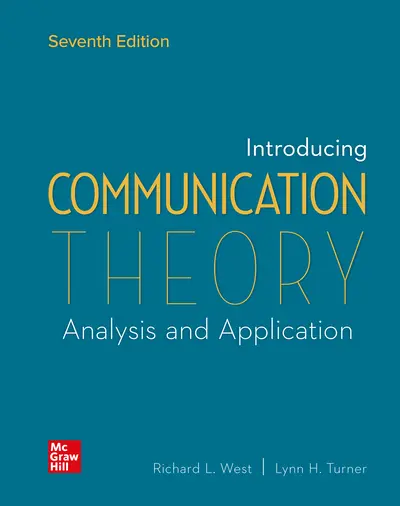
Orders within the United States are shipped via FedEx or UPS Ground. For shipments to locations outside of the U.S., only standard shipping is available. All shipping options assume the product is available and that processing an order takes 24 to 48 hours prior to shipping.
View PriceNote: Connect can only be used if assigned by your instructor.
Learn more about Connect >Orders within the United States are shipped via FedEx or UPS Ground. For shipments to locations outside of the U.S., only standard shipping is available. All shipping options assume the product is available and that processing an order takes 24 to 48 hours prior to shipping.
View Price* The estimated amount of time this product will be on the market is based on a number of factors, including faculty input to instructional design and the prior revision cycle and updates to academic research-which typically results in a revision cycle ranging from every two to four years for this product. Pricing subject to change at any time.
Quick Actions (Only for Validated Instructor Accounts):
Request a Print Sample Contact a RepIntroducing Communication Theory: Analysis and Application focuses on the links between theory and everyday experiences. This text uses an engaging writing style and a consistent, organized template to present the concept of theory and help students become insightful, critical thinkers. The Connect course for this offering includes SmartBook, an adaptive reading and study experience that guides students to master, recall, and apply key concepts while providing automatically graded assessments.
Introducing Communication Theory: Analysis and Application, 7e
Part 1 Foundations
CHAPTER 1: Thinking About Communication: Definition, Models, and Ethics
CHAPTER 2: Thinking About the Field: Traditions and Contexts
CHAPTER 3: Thinking About Theory, Research, and Paradigms
Part 2 Empirical/Post-Positivist Theories
The Self and Messages
CHAPTER 4: Expectancy Violations Theory
Relationship Development
CHAPTER 5: Uncertainty Reduction Theory
CHAPTER 6: Social Exchange Theory
CHAPTER 7: Social Penetration Theory
CHAPTER 8: Social Information Processing Theory
Groups, Teams, and Organizations
CHAPTER 9: Structuration Theory
CHAPTER 10: Organizational Information Theory
The Media
CHAPTER 11: Agenda Setting Theory
CHAPTER 12: Spiral of Silence Theory
CHAPTER 13: Uses and Gratifications Theory
Culture and Diversity
CHAPTER 14: Face-Negotiation Theory
Part 3 Interpretive Theories
The Self and Messages
CHAPTER 15: Symbolic Interaction Theory
CHAPTER 16: Coordinated Management of Meaning
Relationship Development
CHAPTER 17: Communication Privacy Management Theory
Groups, Teams, and Organizations
CHAPTER 18: Groupthink
CHAPTER 19: Organizational Culture Theory
The Public
CHAPTER 20: The Rhetoric
CHAPTER 21: Dramatism
CHAPTER 22: The Narrative Paradigm
The Media
CHAPTER 23: Media Ecology Theory
Culture and Diversity
CHAPTER 24: Communication Accommodation Theory
Part 4 Critical Theories
Relationship Development
CHAPTER 25: Relational Dialectics Theory
The Media
CHAPTER 26: Cultivation Theory
CHAPTER 27: Cultural Studies Theory
Culture and Diversity
CHAPTER 28: Muted Group Theory
CHAPTER 29: Feminist Standpoint Theory
CHAPTER 30: Co-Cultural Theory
Richard West
Richard West is a past President of the National Communication Association. He is also Professor in the Department of Communication Studies at Emerson College in Boston. At Emerson, he has served as the Department Chair for several years, as the Acting Director of the Institute for Liberal Arts and Interdisciplinary Studies, and as the Project Director of the Center for Innovation in Teaching and Learning. He is past President of the Eastern Communication Association, where he received the Past Officer's Award and was recognized as a "Distinguished Research Fellow" in the Association. Rich is also the former Director of NCA's Educational Policies Board.
Both Illinois State University (B.A./M.A.) and Ohio University (Ph.D.) have recognized him as an Outstanding Alum in Communication Studies. Rich's research has appeared in Communication Education, Communication Studies, Communication Quarterly, Day Care and Early Education, Communication Reports, Journal of Family Communication, among other diverse outlets. He has written extensively in the area of classroom communication and has been recognized as a "Leading Scholar" in Classroom Communication by the Communication Institute for Online Scholarship (CIOS). Rich's principle co-author is Lynn Turner. Together with Lynn, he has co-authored 5 books in multiple editions. He is also co-editor of The Family Communication Sourcebook and the co-editor of the Sage Handbook of Family Communication. In 2014, NCA’s Family Communication Division recognized the Sourcebook as its Outstanding Book Award. In addition, Rich has (co) authored dozens of articles and book chapters and is a current member of numerous journal editorial boards. Rich's research has been featured in a number of media outlets including USA Today, Christian Science Monitor, NPR, Toronto Globe & Mail, CNN International, Austin Statesman (TX), among others. When he has some free time, he enjoys working on his 105 year-old summer home in Maine, but privately admits that he would rather hire people than do the work himself!
Lynn Turner
Lynn Turner teaches in the College of Communication at Marquette University. She received her Ph.D. from Northwestern University in 1989. She is the author of several journal articles, books, and book chapters focused on communication studies. She is the recipient of the Marquette University College of Communication Research Award (1998), the Organization for the Study of Communication, Language, and Gender’s Outstanding Book Award (1997) and Outstanding Article Award (2000). She is guest editor (with Richard West) for a special issue of the Journal of Family Communication and she serves on the editorial board of several communication journals. She is the Vice-President of Central States Communication Association and Past-President of the Family Division of the National Communication Association. Her current research interests include family communication, gendered communication, and communication and relationships.